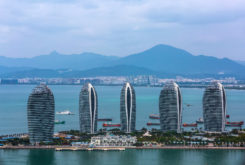Domestic politics in Guinea-Bissau and São Tome and Principe has become more turbulent in the last few years. With new governments in both countries, tension has increased significantly over the last few months and, in unusual fashion, deals with China have been used as a weapon.
At the heart of the dispute in Bissau is a donation of a total of 2,638 tons of rice, in the amount of 3 million dollars, that reached the country at the end of January, to be distributed among the neediest, and was not be sold in any circumstances.
But, according to the Judiciary Police, it was in fact being sold, and part of it was found stored in buildings belonging to members of the outgoing Government.
The Police found 36 tons of rice in a farm that belongs to the Minister of Agriculture, Nicolau dos Santos – which the minister claims to have been rented by the Government.
Another 136 tons of rice were found in warehouses in the city of Bafatá, which the Police says belong to a company called Cuba Lda, owned by Botche Candé, outgoing minister of the interior.
The investigation is supported by the prime minister, Aristides Gomes, and has split in two the country´s government – that includes political rival parties and had as key mission to organize elections in March.
In a statement on April 6th, prime minister Aristides Gomes claims to have given instructions to the minister of Agriculture for the goods to remain in Bissau, with their donation to be made under the close watch of the head of government and a committee coordinated by local governors. It further exhorts the Police to proceed with its investigations.
The political and diplomatic sensitivity of the matter forced the Chinese ambassador to Guinea-Bissau, Jin Hong Jun, to make a public statement last week, indicating that information provided by the Government indicates that the whole distribution of the rice is being done “at a good pace” and that it is up to the authorities “to dispel doubts” about the process.
The donation, for the neediest in the country, was agreed during the visit to Beijing by Guinea-Bissau President, José Mário Vaz, and it was clearly established that donated rice could not be sold, the diplomat said. He added that explanations given by the minister of Agriculture were accepted “in good faith”.
On April 11th, the Agriculture minister was heard by members of the Police for more than two hours, in his office.
In the end, the Police attempted to arrest Nicolau dos Santos, but his security guards reacted, and physical violence broke out.
The Police´s actions are questioned by the Prosecutor-General´s Office, who has called the agent responsible for the investigation to make statements.
Guinea-Bissau has been torn by a bitter dispute between the current president, José Mário Vaz, and the former prime minister, Domingos Simões Pereira, whose PAIGC party won the March elections, but without a majority of the votes – it had to look for support of a smaller party, APU/ PDGB, to form a government.
Both men accused by the Police are political allies of president José Mário Vaz, who faces presidential elections later this year.
With the country´s institutions deeply fragile and influenceable, sources in Bissau question both the defense by the Prosecutor-General of the two ministers, and the timing and resoluteness that the Judiciary Police has shown in pursuing the case, in a particularly embarrassing manner for the president, maximizing public exposure of the case, at a politically sensitive period.
In São Tomé and Príncipe, a similar judicial case, with apparent political motivations has also emerged.
The Judiciary Police accuses two former members of the government of Patrice Trovoada – Américo Ramos, minister of Finance, and Carlos Vila Nova, minister of Infrastructure – of embezzlement of public funds and money laundering, among other offenses.
Under question is a 2015 loan agreement with China International Fund (CIF) Limited, with headquarters in Hong Kong, worth 30 million dollars, to be used in building the São Tomé administrative city and housing for civil servants. The loan, according to São Tomé Government documents seen by CL Brief, had a 5 year grace period, and was to be paid between 2020 and 2036.
According to the Police, 20 million dollars went missing, but the former prime minister Patrice Trovoada has a different version: only 10 million dollars were deposited in the São Toméan Central Bank account at Caixa Geral de Depósitos (CGD) in Portugal, because in the meantime contact was lost with CIF – whose leader Sam Pa disappear in China.
Trovoada says the process has political motivations, denies any wrongdoing and defies the Government to ask the fund to prove the transfer of the remaining amount.
The investigation is also putting the Judiciary Police, headed by Marbel Rocha, and the prosecutor´s office, headed by Kelve Nobre de Carvalho, against each other.
Rocha has questioned the prosecutor´s decision to release Vila Nova on the basis of parliamentary immunity, while the prosecutor has publicly condemned the Judiciary Police´s actions, that its considers invasive of its own powers, going so far as to accuse it of potentially turning the country “into a police state”.
The infighting also brings to light deep political divisions in the country – Patrice Trovoada lost the parliamentary elections of October 2018 to the current prime minister, Jorge Bom Jesus, and has been living in Portugal.
In common with Guinea-Bissau, São Tomé has very fragile institutions, that tend to be used in inter-party disputes.
Relations with China, both at economic and diplomatic level, have been growing fast with both countries.(CLBRief)



